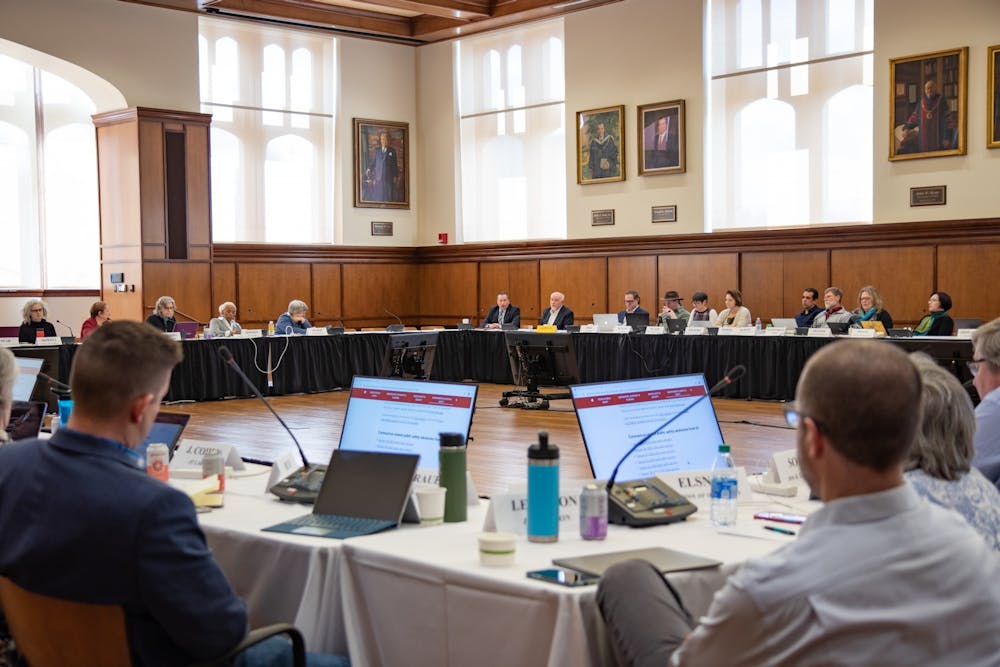With some U.S. universities cutting tenure and removing traditional protections that tenure offers, university officials assure that tenure will remain in place in its current state at IU.
The tenure process is currently a five-year ordeal for IU professors, granting job security for professors' academic careers. Tenure is a sort of promotion – a professor at IU transitions from a temporary, five-year appointment to a long-term appointment once they receive tenure.
“Tenure is a vote of confidence that the rest of your career will go well,” Dr. Rick Van Kooten, Dean of the College of Arts and Science, said. “[Professors are] clearly told what the guidelines are, what the criteria are at the departments, at the college, and I think even at the campus level.”
These guidelines cover three principal areas: research, teaching and service. Dr. Yuzhen Ye, chair of the IU Computer Science Department, said a typical path to obtain tenure is based on a professor’s excellence in research, effective teaching and satisfactory service. Although excellence in teaching is not required, Van Kooten said teaching is still evaluated critically.
Professors are not alone in this journey to tenure. Van Kooten said departments hold yearly reviews for tenure-track professors, and there are online resources and training sessions to help professors prepare and put together an application.
At the end of a professor’s first five years of work at IU, the year of review begins. Professors first put together a dossier — a compilation of all their work including research, teaching and service — and pass this information on to various people and committees.
This dossier is reviewed by their department’s chair, a department committee, their college’s chair, a college committee, the Vice Provost for Faculty and Academic Affairs, a university committee and ultimately the Board of Trustees and IU President Pamela Whitten.
The process, once completed, results in one of two outcomes. Tenure may be awarded, and the professor may stay at the university, or tenure is not awarded, and that professor is fired.
“You get your letter from the Board of Trustees when everything goes through,” Van Kooten said, “You started in May, and you get your final, final, final answer in the following May. And if it’s no, you have one full academic year.”
With a full year of committees to review and decide if a professor may stay at a university, the process causes substantial amounts of stress for professors working towards tenure.
“As a faculty member who went through the tenure process and now who works with faculty going through it, I can attest that it is indeed stressful,” Vice Provost for Faculty and Academic Affairs Eliza Pavalko said. “Both because of the high standard we hold faculty to and because if it is not awarded the faculty member will need to find a job elsewhere.”
This sentiment was echoed by Van Kooten and Ye with Van Kooten, saying it was the most stressful time of his academic career.
Medaille College and Guilford College, universities in New York and North Carolina – respectively, recently changed tenure policies to remove job protections for professors and fired multiple tenured professors due to loss of revenue. This exacerbates relations between faculty and administrators as tenure is considered nearly indefinite job security. However, at IU, Pavalko said tenured professors still have protections afforded to them through tenure.
“Once a faculty member has been awarded tenure, this would only be taken away if the individual was found to have engaged in serious personal or professional misconduct, or incompetence,” Pavalko said.
With the assurance from IU that tenure is not currently changing, IU professors can look forward to job security. After such a milestone, however, IU offers little acknowledgement to these tenured professors.
“You don’t even get a certificate or anything. There’s not something you can hang or your wall or anything. It’s just that, ‘I have tenure’ and then somewhere in the university systems, there’s some database that says, ‘tenured’,” Van Kooten said, “It really is such a big milestone that is, after it’s done, mildly acknowledged.”






